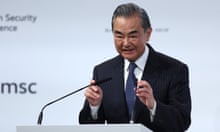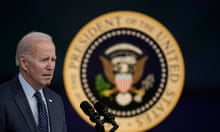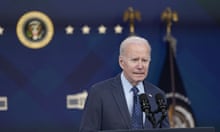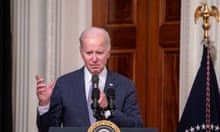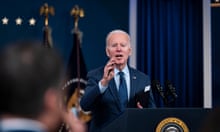The head of the FBI and the leader of Britain’s domestic intelligence agency have delivered an unprecedented joint address raising fresh alarm about the Chinese government, warning business leaders that Beijing is determined to steal their technology for competitive gain.
In a speech at MI5’s London headquarters intended as a show of western solidarity, Christopher Wray, the FBI director, stood alongside the MI5 director general, Ken McCallum. Wray reaffirmed longstanding concerns about economic espionage and hacking operations by China, as well as the Chinese government’s efforts to stifle dissent abroad.
“We consistently see that it’s the Chinese government that poses the biggest long-term threat to our economic and national security, and by ‘our’, I mean both of our nations, along with our allies in Europe and elsewhere,” Wray said.
He told the audience the Chinese government was “set on stealing your technology, whatever it is that makes your industry tick, and using it to undercut your business and dominate your market”.
Ken McCallum said MI5 was running seven times as many investigations into China as it had been four years ago and planned to “grow as much again” to tackle the widespread attempts at inference which pervade “so many aspects of our national life”.
“Today is the first time the heads of the FBI and MI5 have shared a public platform,” McCallum said. “We’re doing so to send the clearest signal we can on a massive shared challenge: China.”
McCallum said the Chinese government and its “covert pressure across the globe” amounted to “the most game-changing challenge we face.
“This might feel abstract. But it’s real and it’s pressing,” he said. “We need to talk about it. We need to act.”
A spokesman for the Chinese embassy in Washington, Liu Pengyu, rejected the allegations from the western leaders, saying in an emailed statement to the Associated Press that China “firmly opposes and combats all forms of cyber-attacks” and calling the accusations groundless.
“We will never encourage, support or condone cyber-attacks,” the statement said.
Asked about Wray’s comments at a briefing on Thursday, the Chinese foreign ministry spokesperson Zhao Lijian told reporters: “The relevant US politician has been playing up the so-called China threat to smear and attack China. Facts have fully proven that the US is the biggest threat to world peace, stability and development. We urge this US official to have the right perspective, see China’s developments in an objective and reasonable manner and stop spreading lies and stop making irresponsible remarks.”
In a nod to current tensions between China and Taiwan, Wray also said during his speech that any forcible takeover of Taipei by Beijing “would represent one of the most horrific business disruptions the world has ever seen”.
Last week, the US government’s director of national intelligence, Avril Haines, said at an event in Washington that there were no indications that Xi Jinping, the Chinese president, was poised to take Taiwan by military force. But she that did say Xi appeared to be “pursuing the potential” for such an action as part of a broader Chinese government goal of reunification with Taiwan.
After the appearance, Wray said he would leave to others the question of whether an invasion of Taiwan was more or less likely after Russia’s invasion of Ukraine. But, he said, “I don’t have any reason to think their interest in Taiwan has abated in any fashion” and added that he hoped China had learned what happens “when you overplay your hand”, as he said Russia had.
Joe Biden said in May that the US would respond militarily if China invaded Taiwan, offering one of the most forceful White House statements in support of Taiwan’s self-governing in decades. The White House later tried to soften the impact of the statement, saying Biden was not outlining a change in US policy toward Taiwan, a self-governing island that China views as a breakaway province that should be reunified with the mainland.
The embassy spokesman said the Taiwan issue was “purely China’s internal affair” and said when it came to questions of China’s territory and sovereignty, the country has “no room for compromise or concession.”
“We will strive for the prospect of peaceful reunification with utmost sincerity and efforts,” the statement said, though it noted that China would “reserve the option of taking all necessary measures in response to the interference of foreign forces”.
The Associated Press and Press Association contributed reporting

